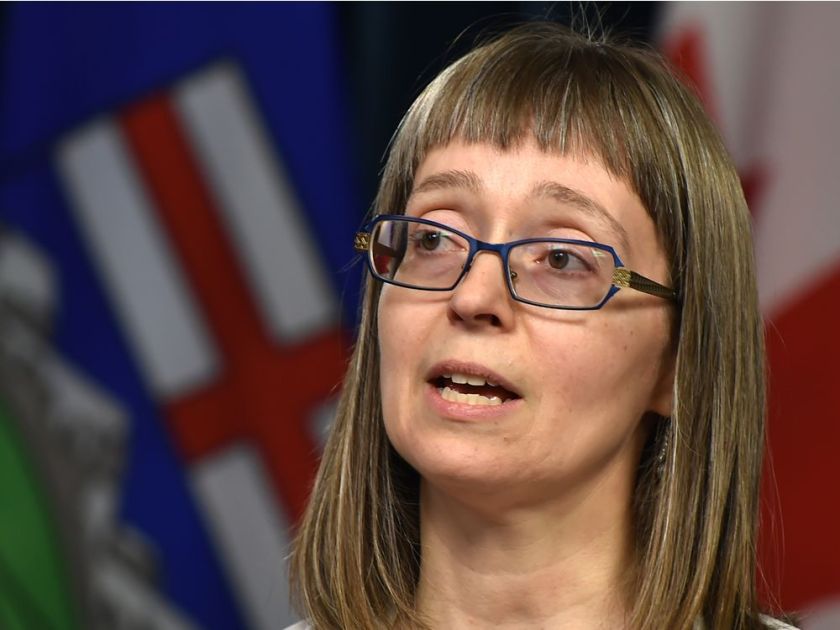Dr. Deena Hinshaw, Alberta’s chief medical officer of health
Two new cases of coronavirus have been confirmed in the Calgary area, in addition to a further case near Edmonton, bringing the total number to seven across Alberta.
Dr. Deena Hinshaw, Alberta’s chief medical officer of health, said Monday that the rising global risk of exposure to COVID-19 means that Albertans must start taking new precautions in their day-to-day lives to help prevent continued spread of the virus.
“At this point, it is likely that we will be dealing with the virus worldwide for many months to come,” Hinshaw said.
“With no vaccine for this virus likely to be available for a year or more, to protect the population we need to protect each other. We can do this by covering coughs and sneezes, washing hands regularly, and most importantly we need to stay home and away from others when we are sick. It is time to start greeting each other with elbow bumps or waves instead of handshakes. This is not an overreaction, but a very practical way of limiting the spread of germs.”
All seven coronavirus cases announced by the province since last week have now been confirmed, according to Hinshaw. She said each case is travel-related.
Of the new cases announced Monday, one is a man in his 30s from Alberta Health Services’ Calgary zone. The man had been in close contact with a fellow Calgary zone woman announced Sunday as the province’s fourth presumed case of COVID-19.
The man had recently travelled to Ukraine, Turkey and the Netherlands, before returning to Alberta on March 2. His symptoms began after he arrived back in Canada.
Another new case is a woman in her 50s from the Calgary zone who recently returned from a Caribbean cruise. Hinshaw said the woman had been aboard the MS Braemar cruise ship from Feb. 11 to March 4 and began developing symptoms following her return.
The AHS Calgary zone extends west to Banff, east to Gleichen, north to Didsbury and south to Claresholm.
The third new case, a woman in her 70s from the Edmonton zone, is a close contact of an Edmonton-area man announced as a presumed case of the virus Sunday. Both had been aboard the virus-stricken Grand Princess cruise ship off the coast of California and returned to Alberta on Feb. 21.
People look out from aboard the Grand Princess cruise ship, operated by Princess Cruises, as it maintains a holding pattern about 25 miles off the coast of San Francisco, California on March 8, 2020.
JOSH EDELSON/AFP
A total of 44 Albertans returned to the province Feb. 21 after travelling aboard that cruise ship.
All three people are in isolation at home. They are expected to fully recover.
According to Alberta Health, COVID-19 has an incubation period of two to 10 days and there is a “very small chance” you can spread germs during the time you have contracted the virus but do not feel ill. Self-isolation is recommended for certain people who have come in contact with an infected person, but are not showing symptoms.
Self-isolation means staying at home and avoiding direct contact with anyone else.
Officials advise all travellers returning to Canada from other countries to monitor for symptoms, such as a fever or cough, for 14 days. Those with possible symptoms are urged to call 811 rather than visit emergency departments or urgent care centres.
Hinshaw said the province’s capacity for running tests of COVID-19 has increased dramatically in recent days, with 1,000 assessments conducted this past weekend alone.
Related
Stampede, other organizers monitoring outbreak
On Monday, the first COVID-19 death in Canada was reported after a man died at a seniors care home in North Vancouver. Hinshaw said Alberta’s public health officials are keeping an eye on the situation across the world, especially with major events at home on the horizon.
“While the risk of exposure to COVID-19 in Alberta is still low at this time, worldwide the risk is rising,” she said.
The Calgary Stampede says it has a “preparedness plan” in place should the virus continue to spread by the time the annual July event, which attracts thousands of guests including from around the world, rolls around.
While the Stampede is working closely with health officials, spokesperson Kristina Barnes said it would be inappropriate to speculate what adjustments might be needed at this point.
So far, it’s “business as usual,” according to Barnes.
“Because we do have so many large gatherings here at Stampede Park, it’s something that we always want to be prepared for — any situation that might need a response like that,” she said. “It’s really hard to speculate not knowing how it’s going to affect our community and then beyond that around the world.”
The packed midway at the 2019 Calgary Stampede on July 9, 2019.
Darren Makowichuk /
Postmedia
The same goes for the Global Petroleum Show this June. Last year, the event drew more than 10,000 international guests.
“At the moment, with three months left until Global Energy Show, the event is taking place as scheduled,” a spokesperson said in an email.
“This being said, we recognize that the situation around the globe is evolving rapidly and … we are prepared to react appropriately to any changing circumstances.”
Hinshaw said health officials have provided guidance as to circumstances under which large gatherings should be cancelled due to the coronavirus outbreak.
“Those factors might include whether people are coming from around the world to an event, whether it’s a local event that has a lot of people,” she said.
“We of course are concerned if there are events where there’s multiple international people coming.”
shudes@postmedia.com
Twitter: @SammyHudes
